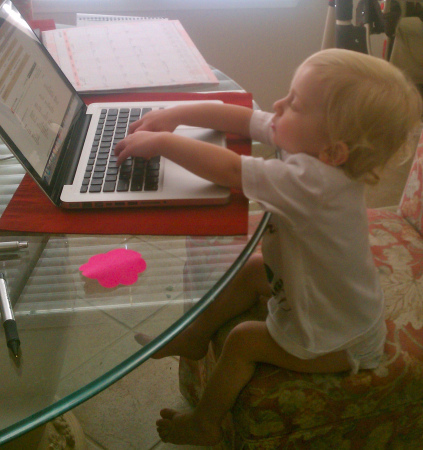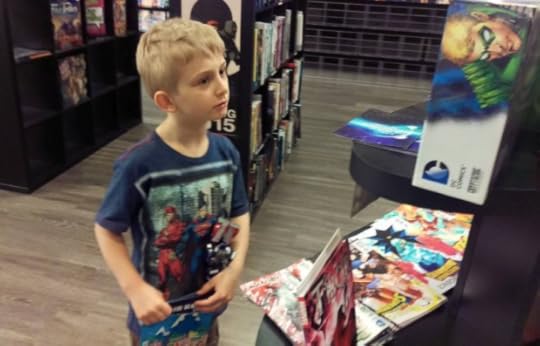Advantages in DISadvantages—Does Our Culture Really Value “Normal”?

Image via Amber West WANA Commons
Last time, when we talked about Barnes & Noble, I mentioned a book by Malcolm Gladwell David & Goliath: Underdogs, Misfits and the Art of Battling Giants. This is a really interesting book because Gladwell peels apart our common perceptions of what an advantage really is. Sometimes, that which others claim is undesirable really isn’t.
It is merely different.
Right now I am at a weird crossroads and admittedly I am a bit scared because I am deviating outside the “accepted.” For those who don’t know, my son The Spawn (Age 5) has had an interesting road. When he was two and a half, he had all four front teeth knocked up into the maxilla and had to have them surgically removed. Twenty thousand dollars in maxo-facial surgery later, we had a little bat.
This created some problems. Obviously, his speech suffered the most. His third word was dinosaur. Before the accident, I figured he’d be like I was and be speaking in full sentences before the age of three.
Yeah.
The best laid plans of mice and men and all. Anyway, his speech has obviously been delayed. Then, on top of this, he is incredibly analytical like his father.
When Spawn was a baby, we had a family friend living with us for a time. I’d discover advanced puzzles all over the house neatly solved and tucked away. I assumed she was picking up after Spawn (the toddler). Only later I discovered that he was solving them. Though they were meant for far older children, he solved them with ease.

Spawn writing his memoirs.
He also plays XBox and can beat a game at the most advanced level in about two days. The same games it took his father and I weeks to unravel.
But good luck understanding him.
When he was barely four, he was “fired” from preschool because he liked zombies too much.
Teacher: We had an incident on the playground. Your son was pretending to be a zombie and it was freaking out the other kids.
Me: Was he biting them?
Teacher: No.
Me: Was he grabbing or touching them?
Teacher: No.
Me: Well then what exactly was he doing?
Teacher: Wandering around with a blank look and moaning.
Me: Sounds like every bureaucrat I ever met. What’s the problem?
Anyway, he is supposed to go off to Kindergarden this year and I am going to homeschool because I feel our culture labels anyone who does not fit neatly into a standardized bell curve as “disabled” or “disadvantaged” or with a “disorder.” The reason I know this is that my own school years were hell because of this type of thinking.
Before we continue, know that these are MY opinions and MY beliefs from MY own experience. As I stare at my baby bat, all I can think of is the nightmare that school was for me.
Kristen was/is NOT Normal

Before it went BOOM!
Though I was gifted verbally, I was in trouble all the time. Seriously. ALL the time. I don’t even remember my third grade classroom. I remember the HALL. I had a terrible time paying attention to one thing at a time and sitting behind a desk.
Guess what? Thirty-five years later nothing has changed.
My mom was rather revolutionary in her parenting. She didn’t care if I did my homework hanging from the curtains wearing a tutu so long as I got it done. Results were all that mattered. Typically, I would spread all my books on my bed, play Tchaikovsky really loudly (over and over and, yes OVER), and do all my subjects at one time. I would do a math problem or two, then flip over to science, then color, then more math. I was most productive when I was doing a lot of things all at one time and I always made perfect scores.
I found that if a math problem was giving me a fit, that shifting subjects helped. I could do something right-brained (write an essay) and my subconscious would often sort out the answer to the math problem (a left-brained dilemma).
Then I would get to class. *head desk*
Kristen talks too much.
Kristen doesn’t use time wisely.
Kristen doesn’t pay attention.

Kristen Circa Third Grade
I had to be moving in order to think. I still do. My brain doesn’t work as well if I’m still.
I asked “Why?” too much. In fifth grade, when the other kids were content to gulp down that no life could possibly exist in the Hadalpelagic Zone of the ocean because there was no sunlight for photosynthesis, I questioned.
What if there are creatures that don’t need sunlight? Creatures that have some other source to convert into usable energy? If various combinations of salts can power a lightbulb, why couldn’t a living organism do something similar?
***Yes, I was ten at the time of this debate and ended up in the hall….yet again.
Imagine how vindicated I felt when years later, scientists discovered there were lifeforms that used volcanic vents and employed chemosynthesis to survive in such an extreme ecosystem (converting chemicals into usable energy).
I remember later in the fifth grade I got into an argument with the same teacher who gave me an F. She’d handed us a maze and the object (per the instructions) was to solve the maze. I began at the end and worked to the beginning and solved it in less than ten seconds (while the rest of the class had barely begun).
My teacher claimed that was cheating and failed me. I told her that the instructions never said which WAY I had to solve the maze, only to solve it.
Anyway, long story short, I am the reason for the current Texas truancy laws. My teachers were nothing short of cruel to me. Rare was the teacher who appreciated my energy. I was a high school drop out twice and labeled as a person with a learning disorder. I scored so low on my SATs they had to check me for a pulse.
A learning disorder.
So because my brain doesn’t work like everyone else’s I have a “disorder”?
Advantage in the “Dis”advantage
What was fascinating about Gladwell’s book, is he talks about the staggering percentage of successful “geniuses” who suffer from dyslexia. A recent study puts it at about a third and the list includes people like Richard Branson, the British billionaire entrepreneur, Charles Schwab (financial genius), Craig McCaw (cell phone pioneer), the founder of JetBlue David Neeleman, John Chambers the CEO of tech giant Cisco, etc. Einstein was a dyslexic, so was Walt Disney.
Y’all get the point.
Toss in ADD, ADHD, Asperger’s, etc. and I would venture to say that “normal” isn’t very “normal” among the extraordinary. What I find so perplexing is that it seems every parent wants a “child genius” but the second it looks like the kid might not be “normal” in come the meds and therapy.

Two hyper peas in a pod.
Which leads me to ask: Are we medicating out the very genius we say we value? I know in my late 20s I conceded to meds to “control” my “disorder” and it was hell. All my creativity evaporated and I was lost. I fell into deep depression.
Finally, I just accepted I was Abby Normal and rolled with it. I left Corporate America because I simply did not do well sitting behind a desk. Instead of staying in a traditional job (where I was also in trouble ALL the time), I changed tactics and became an entrepreneur.
I am the person who wrote almost a half a million words in one year. I’ve written almost two million words in blogs alone. I run two businesses and blog and write and teach. I also am almost a blue belt in Brazilian Jiu Jitsu and I help teach the kid’s BJJ class three days a week (Mommy-Spawn time). Rumor has it, sometimes I even clean my house :D .
Yet, I appreciate that while my “Disability” comes with a number of advantages (high energy, high creativity) it has some downsides. I have to be extra careful to be more self-disciplined and finish what I start.
Anyway, when it comes to The Spawn, I hope to give him the same freedom to be uniquely HIM that my mom did for me. Frankly, had she not been so free with me at home, I probably would have grown up believing I was damaged (like the schools told me). Ergo my decision to homeschool.
What Does the Future Hold?
This does make me think. The public education system was created in the Industrial Revolution to create educated workers for the future. But the system was educating future employees of a factory-model system. Now that factories have gone to China and Mexico, how wise is it to discount those who are nonlinear thinkers? How much advantage do we gain retraining them to think in “accepted” ways because it is easier?
We live in a multimedia society that demands multitasking. In fact, most jobs require that we do more than one thing at a time and that we be able to shift tasks quickly and easily. So what exactly do we gain by claiming something is wrong with a kid because he/she can’t focus for an hour or more on ONE thing?
And I am not saying there is anything “wrong” with “normal”, only that maybe it is idealized too much. Also, I more than resent being told I have a “disorder.”
Our culture is biased against introverts the same way. Because a kid isn’t super social and chatty and prefers to be alone, something is “wrong.” We encourage all this talking when the world would be a far better place of people did more listening. We idealize the extrovert at the expense of the introverts. Similarly, we idealize “normal” and anyone who is outside this model has a “disorder.”
Which is utterly ironic because the most valued innovators in human history were anything but NORMAL. In fact, I wonder if “normal” won’t go extinct in the next 20 years.
Before the advent of the printed word, humans had prodigious memories and learned orally and kinesthetically. Then, sure, once we ventured into a print paradigm and an industrial model, paying attention to ONE thing for long periods of time and thinking/learning linearly and via print were advantages.
But what about in a multimedia world?
Are we seeing a rise in learning “disabilities” or are we seeing evidence of the human brain’s amazing plasticity? That the brain is simply adapting to drastic social change?
We try to make kids “normal” but we VALUE those who are different. We also say we value creativity, but then label or medicate anyone who is different. Seems we are conflicted, to say the least.
Definitely food for thought.
What are your thoughts? Do you have a learning “disorder”? Does it bother you to be labeled in such a way simply for being different? Do you think our culture is Janus-faced? We “say” we want innovators but then we label them as something undesirable?
Quick Announcement: Due to popular demand, I am rerunning my Hooking the Reader—Your First Five Pages at the end of the month and I am doing something different. Gold Level includes me looking (and shredding your first five) but I have added in some higher levels and will look at up to 20 pages. This can be really useful if you’re stuck. I can help you diagnose the problems. It’s also a great deal if you have to submit to an agent and want to make your work the best it can be.
I LOVE hearing from you!
To prove it and show my love, for the month of JULY, everyone who leaves a comment I will put your name in a hat. If you comment and link back to my blog on your blog, you get your name in the hat twice. What do you win? The unvarnished truth from yours truly. I will pick a winner once a month and it will be a critique of the first 20 pages of your novel, or your query letter, or your synopsis (5 pages or less).
For those who need help building a platform and keeping it SIMPLE, pick up a copy of my latest social media/branding book Rise of the Machines—Human Authors in a Digital World on AMAZON, iBooks, or Nook.







